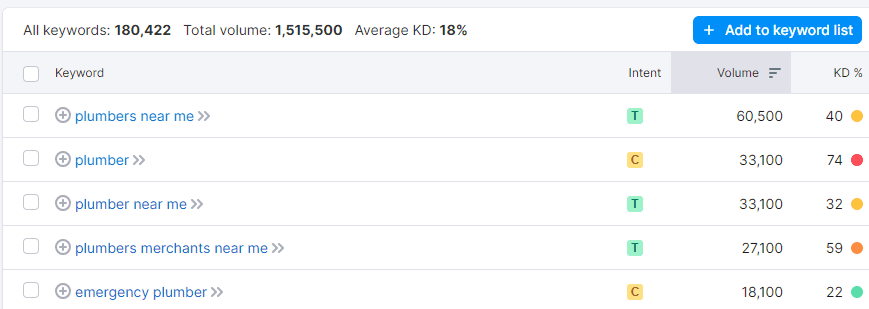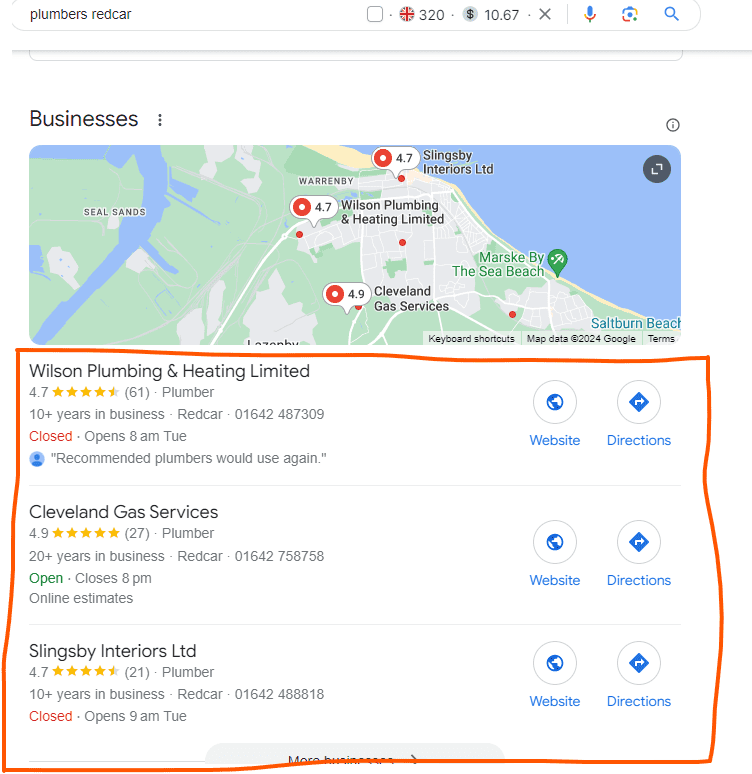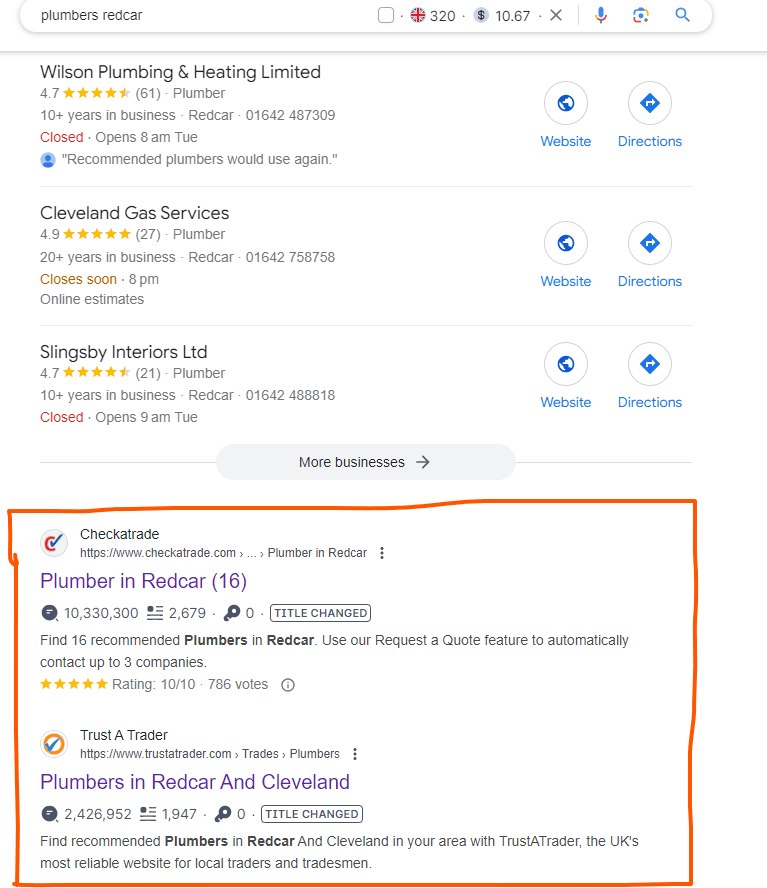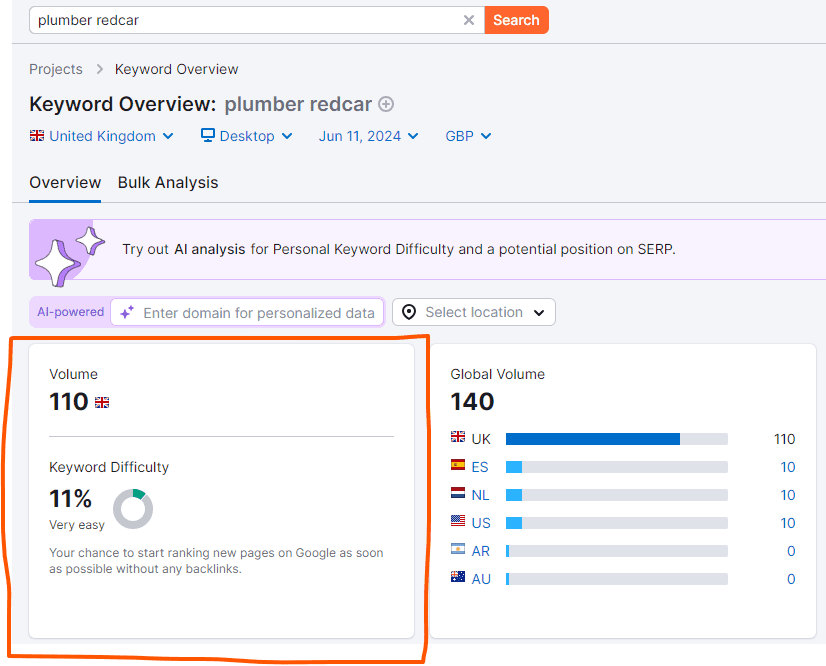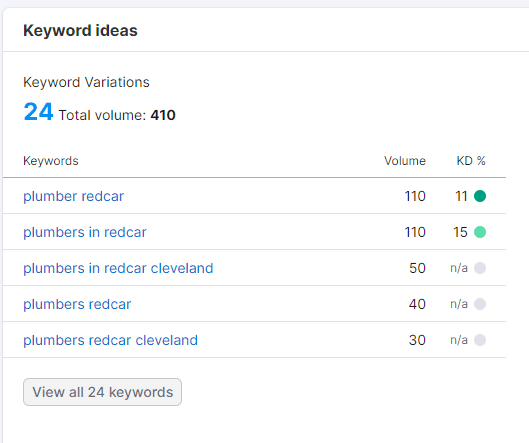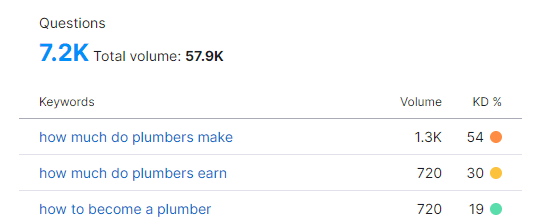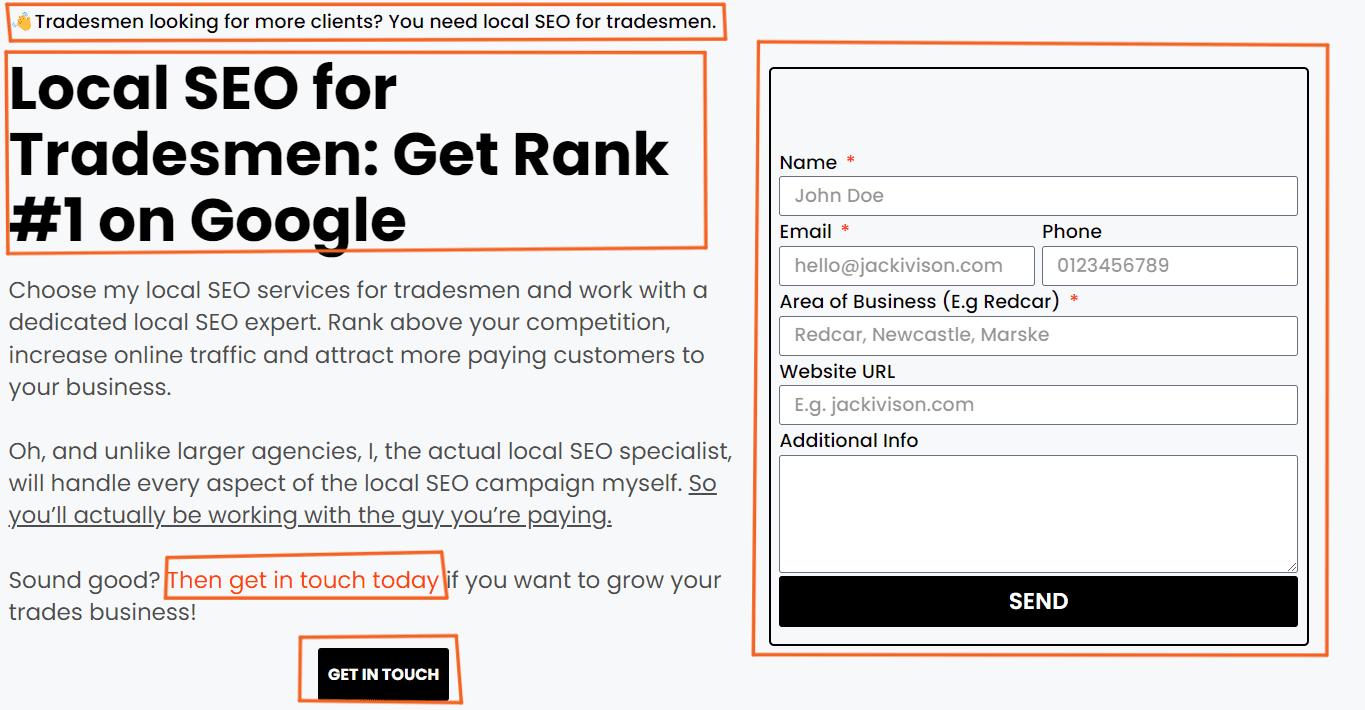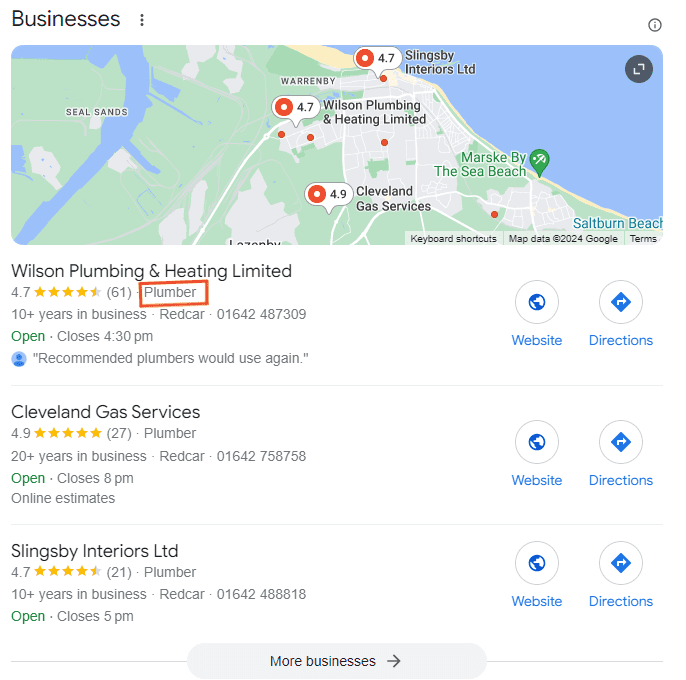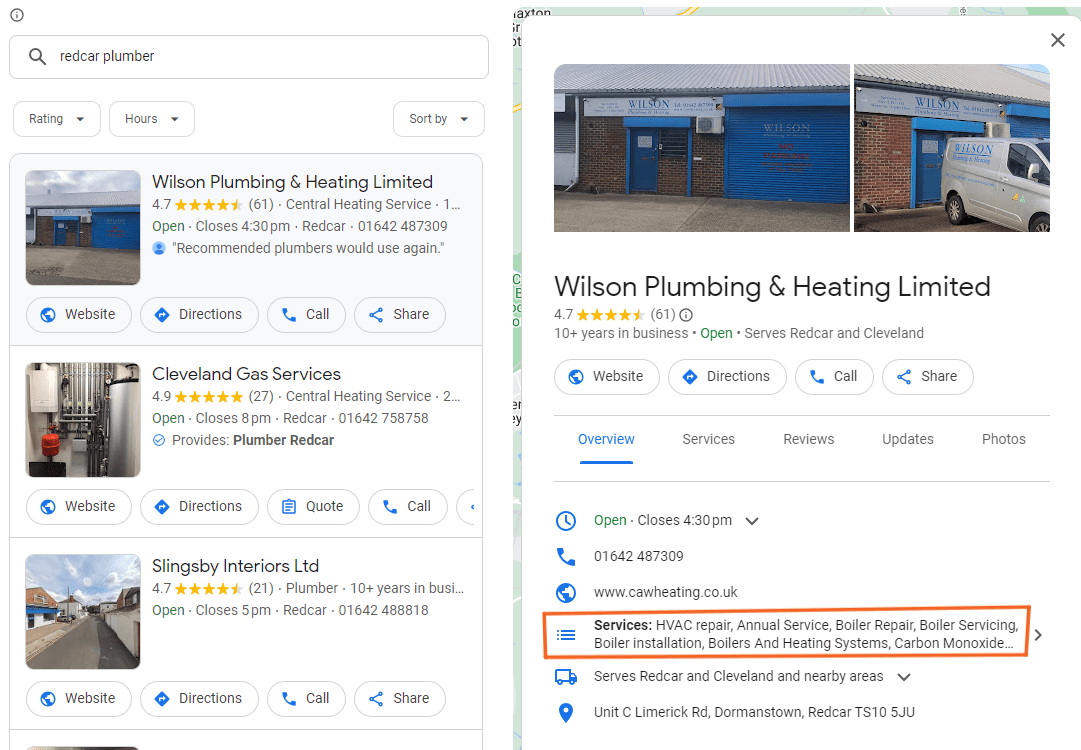Local SEO for Plumbers: Get Rank #1 on Google
Boost your plumbing business with my specialised local SEO services for plumbers.
I’ll personally manage every detail of your plumbing SEO strategy, ensuring you outshine competitors, drive more website traffic, and gain more paying customers.
Forget the large agencies or SEO specialists where you never know who’s working on your SEO campaign. With me, you collaborate directly with the expert you hire – me!
Need SEO for your plumbing company? Contact me today.
How do you do local SEO for a plumbing business?
Follow these SEO techniques, and you’ll grow your online presence and attract more plumbing clients from Google.
Are you not interested in learning and just want an SEO expert to do it for you so you can get back to doing what you do best: running your business?
What is Local SEO For Plumbers?
The aim of search engine optimisation (SEO) is to secure the top spot in search rankings for the online searches your potential customers are actively looking for.
Now, here’s what makes SEO so great:
When executed correctly, the traffic you attract from Google is highly targeted.
This means you won’t be wasting time with people just browsing around;
Instead, you’ll connect with those ready to hire a plumber, helping you secure jobs more quickly.
This effectiveness is mainly due to what we call search query intent.
Take, for instance, someone searching for a “plumber near me” or “emergency plumber in Redcar.” These searches show that the person has a specific need.
By crafting a web page that directly addresses their concerns, you’re far more likely to improve your search engine rankings, catch your target audience’s attention, and meet their needs.
This approach differs from social media advertising, where your ad might pop up as someone scrolls through their feed.
On social media, users aren’t necessarily looking to hire a plumber, so the likelihood of turning viewers into customers is generally lower.
There are two main strategies to attract prospective customers from Google using SEO:
- GBP (Google Business Profile) or Local SEO, as it is also known.
- Traditional Organic SEO.
I’ll get into these, but first, let’s look at the online data for plumbing services:
Search Demand Data for Plumbing Services
According to the keyword site I use for data, Semrush, there are over 1,500,000 searches per month, alone, for ‘plumbing’ related services in the United Kingdom:
And when you go down to the local level, say for Redcar, there are hundreds of searches every single month for people seeking local plumbers:
This means prospective clients are now (yes, right now) searching for plumbing services like yours.
And if you’re not ranking for these terms, your competition is taking cold, hard cash away from you and your business.
Here’s how to position your business in front of them instead:
1. Your Google Business Profile (Local SEO)
It used to be called Google My Business, but it refers to the local pack you see on Google.
In most cases, three plumbing companies will show up right away:
Ideally, you need to be in the top 3 selected to get the most qualified leads for your business.
Otherwise, potential clients must click in and find your business amongst the rabble.
There’s no need to worry about the latter; I’ll teach you the former (how to get in the top 3) in a second.
2. Traditonal Organic Traffic SEO Ranking
While the local pack does sit above traditional SERPs (search engine results pages), with SEO, you want to cover as much space as possible.
Claiming as much ‘online real estate’ as possible will ensure that a prospect clicks on your business rather than anyone else’s.
You should also list your plumbing services in plumbing industry directories like CheckaTrade, TrustaTrader and Yellow Pages (Yell).
This strategy helps to maximise your visibility online – as you’re covering as much space as possible.
Now that you’re familiar with the basics let me guide you through ranking in Google’s Local Pack and traditional organic search results to start attracting new customers.
Complete Plumbing SEO Strategy for Your Business
Every plumbing business marketing plan should begin with SEO.
Given there are over 200 Google ranking factors, it might feel overwhelming at first.
However, I can assure you that mastering the fundamental principles will set you up for SEO success.
Does this mean you should handle SEO on your own?
Honestly? No.
You should hire a professional local SEO who knows what they are doing;
So you can get the results you’re looking for AND save yourself from pulling your hair out over it.
Oh, and because you can keep doing what you do best; running your plumbing business.
HOWEVER.
Understanding the key elements will help you collaborate effectively with an SEO company that knows its stuff.
Or truly understand what you’re doing.
If you do decide to go down the DIY SEO route.
Let’s get started.
First Up, Keyword Research
The goal of keyword research is to find the right keywords (search terms people put into Google) that potential clients are entering into a search engine.
You can come up with these on your own, based on your own knowledge of your business, but I would recommend using a keyword research tool.
For this example, I will be using Semrush.
Once you’re in Semrush, go to ‘Keyword Overview’ and enter;
Plumbers + [Your City]
From this, we now have a great idea of the search demand.
However, this is not the end of our keyword research efforts.
Semrush may show other variations of the keyword that may have more search volume (and could even be more relevant)
You must determine if one of these keywords is a better alternative for your target audience.
I would also note down (preferably in a spreadsheet) any question-relevant or information-based keywords, as these will be used later when we create other assets that appeal to your audience.
Design your Plumbing Website for Conversions
No matter how stellar your SEO may be, it’s pointless if your plumbing website isn’t tailored to convert visitors into clients.
Taking your plumbing business’s website design seriously is crucial.
Here are a few straightforward strategies to implement to get those conversion rates up:
Speed Up Your Website
Check your website’s performance using Google PageSpeed Insights.
If your score is under 80, bump it up your to-do list, as it’s vital for a good user experience.
Slow loading times can negatively impact your bounce rate (or engagement rate, the metric used in Google Analytics 4).
This is a crucial issue that shouldn’t be overlooked; the longer your site takes to load, the greater the chance people will just leave and look elsewhere for their services.
(Your competitors!)
Highlight Your Phone Number
Ensure your phone number is visible at the top and on every page.
This reduces obstacles for potential clients, making it easier for them to call your business.
Tip: The more steps it takes to contact your businesses, the less likely potential customers are to proceed.
Design Conversion-Focused Landing Pages
A landing page’s sole purpose is to convert visitors into leads.
You know the importance of clearly displaying your phone number, but also ensure you include lead capture forms at the top of the page, various calls to action, and social proof.
Use Engaging Visual Content
Visual elements can significantly increase user engagement and convey your services effectively.
Include high-quality images of your team, the work you’ve completed, and video testimonials from satisfied customers.
These visuals can help build trust and encourage potential clients to reach out.
Improve Website Navigation
Make sure your website is easy to navigate.
A clear, intuitive menu structure ensures that visitors can quickly find the information they need, such as services offered, pricing, and how to contact you.
Consider including a search function for larger sites.
Utilise Customer Reviews and Testimonials
Apart from video testimonials, prominently display customer reviews and testimonials throughout your site.
This social proof can significantly influence new visitors’ decisions by showcasing the reliability and quality of your services.
Especially since it’s from someone who isn’t connected to the business.
You can big up your plumbing business all you like, but people will ignore it – seeing what past customers say instead.
Ensure Mobile Optimisation
Given the increasing use of mobile devices to access the web, ensure your website is fully optimised for mobile.
This means fast load times, easy navigation, and accessible contact forms on smartphones and tablets.
What About Blog Posts?
If you know anything about SEO, especially the online buzz, one of the main areas people talk about is blog posts and content marketing.
But I haven’t mentioned that yet, what gives?
Well, while blog content is essential, yes
In some cases, content creation on your own site is unnecessary.
And in my opinion
It should be at the very bottom of the to-do list anyway.
Why?
Everything else on this page (the page you’re reading right now) is far more important, and when you’re starting out, you’re not likely to rank for these keywords anyway, especially without backlinks.
When you get to this point, what should you be writing about?
Remember those question-related keywords I asked you to grab earlier when you were doing the keyword research part of this SEO process?
You should create content around answering these questions.
And make it as relatable as possible to your target audience.
That way, you can get potential new clients to your business outside of the main commercial keywords you’re ranking for
Whilst this traffic isn’t going to be piping hot like a fresh roast on a Sunday
It will still get your business in front of your ideal client, keeping you at the forefront of their minds should they choose to seek services like yours in the future.
Here are some content ideas you can use when you start creating blog content:
- How-to Guides
- Case studies
- Product reviews
- Or Preventive Maintenance Tips
Analytics
While a conversion-focused design is an excellent start, you must track your SEO performance to determine whether you’re achieving a return on investment (ROI).
I suggest setting up Google Analytics 4 to monitor traffic and conversions.
Using Google Search Console can also help you keep tabs on your SEO results page rankings.
Google Business Profile (was Google My Business Profile)
Regarding SEO marketing for local businesses, your Google Business Profile is the most vital tool in your local SEO strategy.
It’s a powerhouse for generating leads in your industry and is the main part of local SEO for plumbers and their businesses.
Optimising it is straightforward if you follow some best practices.
You must grasp three key concepts: relevance, distance, and prominence.
Relevance + Distance
These two are crucial because your SEO efforts are in vain if you don’t have an address in the local area you’re targeting.
Once you’ve confirmed your location, it’s essential to clearly identify yourself as a plumbing service in the specific service area you work in.
Next, ensure you optimise these elements effectively:
Firstly, choose the correct business category.
For a plumbing business, selecting “Plumbing” would obviously be most appropriate for your business.
And add the local services you provide too:
Prominence
After you’ve mastered the basics of your Google Business Profile, the next step is to gather as many reviews as possible.
Aside from your location, this is the most crucial factor for enhancing your visibility.
One of the most effective ways to gain more local reviews is simply to ask your customers.
New and old.
You can do this face-to-face, via email address contact, or by sharing a link to your review page on your website.
You can also provide incentives if you’d like to help encourage customers further.
HOWEVER.
This IS against Google’s guidelines.
So, if you choose to go this route, be careful.
Once these local SEO pieces have been properly put together and you’re finally appearing on Google Maps as well, thanks to this, it’s time to focus on on-page SEO.
Get Rankings with On-Page SEO
On-page SEO is critical for improving local search rankings on Google as it helps ensure your content is optimised for search engines.
You might have the best website content in the world, but if you don’t follow Google’s ‘rules,’ you won’t rank.
And when you’re not ranking?
Your business won’t be flourishing as it should be.
Some of the on-page SEO tactics include:
- Making sure the pages (service pages, blog pages, basically any page on your site) load as fast as possible
- Place your main keyword in URLs, Title tags, meta descriptions, h1, h2, first and last sentences – as natural as possible.
- Optimising for NLP Keywords
- Make sure your images are unique and copyright-free.
All these techniques help Google understand the content on your page and can help you rank higher in search results for your chosen keyword(s)
Now, here’s the kicker:
You can do everything right; follow my expert guide step by step AND STILL not get the results you’re looking for.
Why?
Because you’re missing out on one major ranking factor (that Google loves to downplay):
Backlinks.
Why Your Plumbing Business Needs Backlinks
Off-page SEO is crucial as it enhances your website’s authority and organic visibility. Link building is the primary technique used in off-page SEO.
The goal is straightforward: accumulate as many high-quality and relevant backlinks as possible.
Achieving this will bolster your site’s authority, making it easier to rank in Google search results for the terms you’ve chosen to target previously.
But how can you get backlinks WITHOUT spending thousands of pounds (and risking your site from being penalised)?
Here are three strategies to help you gather more backlinks:
- Guest blogging: Reach out to blogs and websites within your industry and offer to write a guest post. An excellent way to start is by searching “write for us + plumbing“ on Google to find potential opportunities.
- Broken link building: Use tools like Broken Link Checker to find websites with links to outdated or non-functional content. You can then approach these websites and propose providing a working link, which can help you secure a backlink while also aiding the website owner in improving their site.
Other Off-page SEO methods you can utalise
As I’ve mentioned, backlinks are by far the best off-page technique you should need and must utilise to get the results you’re looking for.
However, other off-page SEO methods can help your site’s growth.
Here are the main ones I would focus on:
Local Citations (Online directories)
Local Listings are crucial in boosting your business’s online presence, especially for targeting audiences in your specific geographic area.
To maximise the benefits of local listings:
- Register Your Business: Ensure your business is accurately listed on significant platforms like Google My Business, Bing Places, and Yelp. Include all essential details—business name, address, phone number, and website. And these business listings are consistent.
- Consistency is Key: Keep your contact information consistent across all platforms. Discrepancies can confuse potential customers and negatively impact your search rankings.
- Encourage Reviews: Solicit reviews from satisfied customers. Positive reviews can improve your online visibility and attractiveness in local search rankings.
- Update Regularly: Keep your listings updated with current information, including hours of operation, services offered, and photos of your business.
Answer Questions on Quora
Participating in Quora is an effective strategy to establish your expertise and drive targeted traffic to your website.
Quora allows users to ask questions and provide answers on numerous topics, making it an ideal platform for demonstrating knowledge in your industry.
Here’s how to make the most of Quora:
- Select Relevant Topics: Focus on topics directly related to your industry or areas where you can provide expert insights. Quora covers a broad range of subjects, so engaging where your expertise can shine is essential.
- Provide Thoughtful Answers: Offer detailed, well-researched responses to questions. High-quality answers can gain more visibility and upvotes, increasing your profile’s exposure.
- Avoid Overt Promotion: While it’s tempting to frequently link back to your website, Quora’s community and moderators favour informative content over self-promotion. Keep links relevant and use them sparingly.
- Follow Relevant Spaces: Quora has ‘Spaces‘, like communities where users can share content on specific topics. Joining and contributing to relevant Spaces can further establish your authority and reach.
- Engage Regularly: Regular participation is critical. You’ll build a following by consistently providing valuable answers and enhancing your reputation as an expert.
Posting/Interactions On Social Media Platforms
Guest Blogging is a powerful method for expanding your reach and improving your site’s SEO through high-quality backlinks.
To effectively leverage guest blogging:
- Identify Target Blogs: Look for blogs within your industry that have a strong readership and align with your business values.
- Pitch Relevant Topics: Offer topics that provide value to the blog’s audience. Tailor each pitch to the specific blog, highlighting how your post can benefit their readers.
- Write High-Quality Content: Produce well-researched, informative, and engaging content that encouraging readers to visit your site.
- Include a Bio and Backlink: Ensure your guest post includes a short bio with a link to your website. This will not only credit you as the author but also drive traffic back to your site.
SEO for Plumbers: What’s Next?
You’re all set to dive into SEO.
The most crucial step is to begin.
The more you delay, the more challenging it becomes to outshine your competitors.
You have two options:
- Do it yourself by using the SEO tips on this page (and this website).
- Or Hire a plumbing marketing services provider or SEO freelancer (like me) who can deliver results for you.
The decision is in your hands.
But take action right now because the best time to start was yesterday!
Why Choose My Local SEO Services?
Choosing me and my local SEO services means entrusting your business to a local lad who genuinely cares about your success.
As a one-man band, you’ll have direct access to the 6+ years of experience you’re paying for, ensuring personalised attention and tailored strategies – I won’t be palming you off to inexperienced juniors or other freelancers under me; which plenty of ‘professionals’ in this area do.
With real-world experience working with global brands, I bring a wealth of knowledge to the table, making conquering the local market a manageable task.

